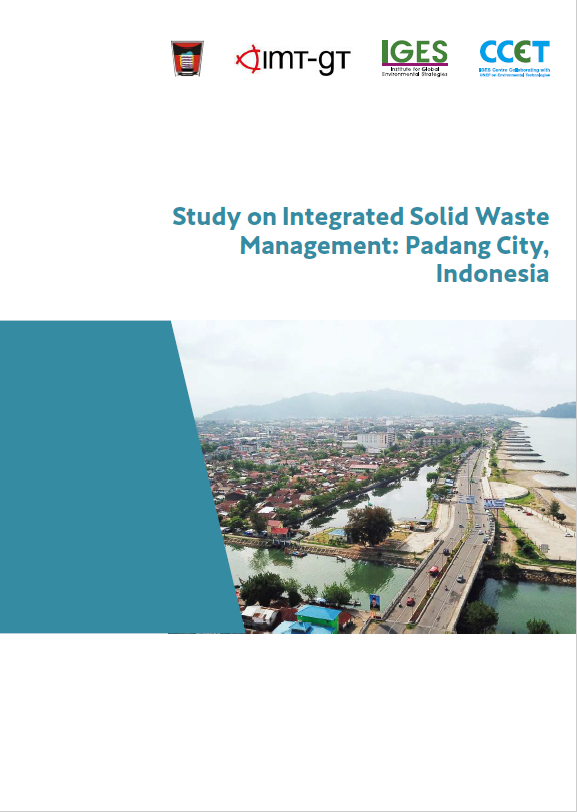One emerging issue in Padang City, Indonesia is waste management. In addition to a rise in population, modern lifestyles and tourism development have resulted in burgeoning waste generation, as well as more littering and burning of waste. This problem has exceeded the waste management capacity of the city. Consequently, the Batang Arau river, one...
- Clear all
- Research Unit: (-) City Taskforce
- SDGs: (-) Goal 11. Sustainable Cities and Communities
- Topic: (-) Co-Benefits
- Topic: (-) Low-Carbon Societies
Results 1 - 10 of 11 (Sorted by date)
The concept of 1.5-degree lifestyles involves changes in household consumption for achieving levels of per person carbon footprint compatible with the 1.5°C target of the Paris Agreement (IPCC, 2018). This requires, on average, emitting the equivalent of 2.5 tons of CO₂ per person per year by 2030, and 0.7 tons of CO₂ per person per year by 2050...
In Ketahanan Iklim Perkotaan (English: Urban Climate Resilience)
In Bahasa: Membangun Kota-kota rendah karbon di Indonesia memerlukan tiga faktor utama yang berkontribusi: membangun kapasitas, melibatkan pemangku kepentingan, dan memobilisasi sumber daya. Faktor-faktor tersebut tidak terpisah atau berbeda-beda namun saling tumpang tindih dan saling memperkuat satu sama lain. Sebagai ilustrasi, peningkatan...
In Ketahanan Iklim Perkotaan (English: Urban Climate Resilience)
In Bahasa: Pengembangan skenario pembangunan rendah karbon dapat digunakan untuk membantu perencanaan jangka menengah dan jangka panjang sehingga membantu para pengambil kebijakan kota-kota besar agar dapat mengadopsi lebih awal mengenai cetak biru perencanaan. Proses perencanaan skenario pengurangan emisi di masa yang akan datang untuk skala kota...
Indonesia begins to prepare a long-term GHG emissions reduction target (2050), which is commonly called Long Term Strategy (LTS). In line with this National LTS, DKI Jakarta is preparing its Provincial LTS aiming to establish the Low Carbon Development Strategy (LCDS) for achieving the Low Carbon Society (LCS). In conjunction with this DKI Jakarta...
In Journal of the Eastern Asia Society for Transportation Studies
Due to its significance for bringing the considerably benefit to the transportation network performance, the several initiatives has been proposed for evaluating and improving the pedestrian facilities. However, such efforts are generally conducted within the framework of walkability, which typically put the attention to the walker perspectives...
Following up the Presidential Regulation 61/2011 and 71/2011, Semarang City as one of the cities in Indonesia has a liability in the GHG reduction activities. This research on the low carbon society (LCS) scenario for Semarang City are carried out aiming to contribu-tion to promoting climate change actions and policies in the city. This study is...
The Institute for Global Environmental Strategies (IGES) and Semarang City Government concluded an agreement to collaborate and support the implementation of City Resilience Strategy (CRS) on 24 May, 2016. IGES provides a total solution on actionable plans by conducting the following activities (Figure 1): 1) Developing low-carbon society scenarios...
急激に都市化する開発途上国の都市においては、経済成長を維持しながら快適で持続可能な都市環境を実現していくために、効率的な資源循環や省エネ施策を推進し、環境負荷を最小限に留める「低炭素でレジリエントな持続可能な社会」への移行が重要な課題となっている。昨今、様々な国際的な枠組において、都市・自治体を含む非国家主体の重要性が認識されてきている。本業務では、このような都市の重要性に鑑み、本邦自治体や企業が有する都市の環境改善ノウハウや技術等を開発途上国の都市の課題やニーズに合致した形で提供することにより、都市間連携の強化を図ることを目的に、自治体のニーズ等の調査、パイロット研修の実施や情報発信業務を行った。
パリ協定に掲げる今世紀後半に脱炭素社会(温室効果ガス排出量が正味ゼロの状態)を実現させるためには、経済成長が著しいアジアにおいて、持続可能な低炭素社会の構築に向けた動きを加速させることが必要である。近年、経済成長著しいアジアの都市では、急激な都市化により、資源やエネルギー消費量が増大し、交通量増加に伴う交通渋滞が頻発しており、生活や経済活動に伴う廃棄物、排水、排ガス、温室効果ガス(GHG)等の排出量が増加するなど、住民の生活環境の悪化を招いている。これらの都市の経済成長を維持しながら快適な生活環境を守っていくには、効率的な資源循環や省エネ施策を推進し、環境負荷を最小限に留める持続可能な都市形成にシフトしていかなければならない。 我が国は、開発途上国においてこのような取組を支援すべく、GHG...


